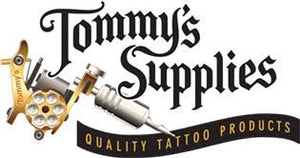Can One Power Supply Handle All Tattoo Machines? What Artists Should Know

TL;DR:
Most modern power supplies can power rotary, coil, and pen-style machines—but not all do it equally well. Factors like voltage range, jump-start capabilities, and power consistency determine compatibility. The right power supply should offer adjustable voltage, stable output, and versatile connection options like clip cord, RCA, or wireless adapters.
Introduction
With the wide range of tattoo machines available today—coil, rotary, pen-style, and even wireless—it’s natural for artists to ask: Can one power supply handle them all?
The short answer: Yes… with the right features. But there are important technical and functional differences between machine types that affect how they interact with power sources.
In this article, we break down the key compatibility considerations so you can choose a power supply that adapts to your evolving toolkit.
The 3 Main Tattoo Machine Types (and What They Need)
1. Coil Tattoo Machines
Coil machines are mechanical and analog, relying on electromagnetic coils to move the armature bar and drive the needle.
Power Requirements:
- Voltage range: 6–10V
- Needs strong, consistent AC/DC output
- Benefits from analog or digital power with quick response time
- Commonly uses clip cord connection
- Typically paired with foot pedal control
Key Consideration:
Coil machines draw slightly more current and fluctuate more than rotary machines—so they demand a power supply with high responsiveness and clean energy.
2. Rotary Tattoo Machines
Rotary machines use an electric motor and are generally quieter, smoother, and more lightweight.
Power Requirements:
- Voltage range: 4.5–9V
- Draws less current than coils
- Very responsive to voltage changes
- Uses RCA connection (most commonly)
- Can operate with or without a footswitch
Key Consideration:
While rotary machines are less power-hungry, they require stable output and fine voltage tuning for optimal performance.
Tattoo pens are a variation of rotary machines, designed to mimic the feel of holding a pen. They often require specific power characteristics to match their compact, high-performance motors.
Power Requirements:
- Voltage range: 5–10V (depends on brand/model)
- Some require jump-start mode (for stiff motor startups)
- Prefer steady DC output
- Always use RCA or wireless power
Key Consideration:
Some power supplies underdeliver on initial torque, causing pens to “stall” unless a jump-start feature is included.
Yes—if it meets these conditions:
- Wide Voltage Range
Look for supplies that offer at least 3–12V adjustment. This covers everything from soft rotary shading to punchy coil lining.
- Clean, Stable Output
Good power supplies regulate current without “ripple,” voltage drops, or interference—especially important for coil users.
- Multiple Connection Types
Compatibility with clip cords, RCA cables, and optional adapter ports is essential if you switch between machine types.
- Jump-Start Mode (Optional)
Useful for pen-style machines with high-torque motors that can resist initial startup without a short burst of power.
- Memory Presets
If you alternate between machines frequently, being able to save voltage profiles is a major time-saver.
- Footswitch Support or Footless Option
Coil users typically rely on footswitches, while rotary artists often prefer continuous power flow.
How to Know If Your Power Supply Is Up to the Job
Ask these questions:
- Does it offer precise voltage adjustment in 0.1V increments?
- Can it run for long sessions without overheating?
- Is the voltage display accurate and easy to read?
- Does it include both RCA and clip cord inputs?
- Does it feature overload or short-circuit protection?
If the answer is yes, your power supply is likely universal.
Best Practices for Using One Supply Across Machines
- Label your cables to avoid confusion between RCA and clip.
- Store presets for different machines: e.g., “Liner 7.5V,” “Shading Pen 9V.”
- Use quality connectors and cords to reduce resistance and ensure clean transmission.
- For wireless setups, ensure you have battery packs compatible with each machine.
At Tommy’s Supplies, we stock versatile power supplies designed to work with both legacy coil systems and modern rotary/pen machines—ensuring performance across all formats.
Do Wireless Power Supplies Work on All Machines?
Wireless power packs are increasingly popular—but not all machines are compatible.
Works best with:
- Rotary pens
- Lightweight rotaries
- Machines with RCA connection
May struggle with:
- Coil machines (need higher and more stable current)
- Machines that require jump-start
Tip: Look for wireless packs that offer:
- 12V+ output range
- Jump-start mode
- Fast recharge or swappable batteries
FAQs
Q: Can I damage a machine by using the wrong power supply?
Yes. Under-powering a machine can cause inconsistent needle movement, while overpowering can cause overheating or motor stress—especially with coil machines.
Q: Do I need to switch voltage for different needles or styles?
Yes. Lining generally requires a lower, punchier voltage, while shading and packing often need smoother, higher voltage for blending.
Q: What’s the difference between clip cord and RCA?
- Clip cord is older and used for coil machines.
- RCA provides more stable connection and is preferred for rotary and pen machines.
Q: What is “jump start” mode?
It’s a feature that gives a brief voltage boost (usually 10V+) at startup to help rotary pens overcome motor resistance.
Q: Can one wireless battery work with multiple machines?
Only if they all use the same connection type (RCA vs. 3.5mm) and draw similar power.
Conclusion
A high-quality, versatile tattoo power supply can absolutely handle all your machines—if it’s built with flexibility, power consistency, and compatibility in mind. From high-powered coil rigs to pen-style rotary machines, the right unit should adapt to your tools and not the other way around.
At Tommy’s Supplies, we carry multi-compatible power units trusted by professional artists who demand reliability from every stroke. Whether you’re simplifying your setup or upgrading for flexibility, our curated range has you covered.










